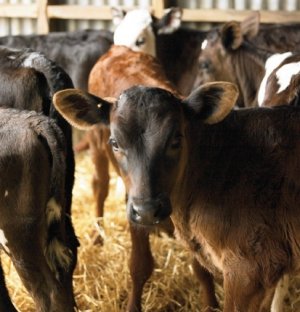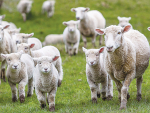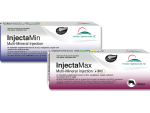“It’s most important to remember a calf needs to drink at least 10% of its bodyweight in fluids every day. That means a 40kg calf needs at least 4L and it will comfortably take 6L,” he told delegates.
If a calf has been scouring for a day before it is detected, as is quite likely, it will already be 5% dehydrated so needs an extra 2L of electrolyte just to get it back to normal. “So it needs a minimum of 6L of electrolyte.”
Whether scours are nutritional – white faeces due to protein (casein) escaping from the abomasum and passing straight through the small intestine – or infectious, “treatment is exactly the same,” he stressed. “The calf will die of dehydration and lack of energy, not due to the bugs. Get as much milk and electrolyte in as you can.”
Many vets still say don’t give milk to scouring calves, based on the theory the fat and lactose in the milk feed the bacteria or virus causing the scours. But the calves desperately need the energy the milk provides and it will not exacerbate the scours, he said. “The whole thing is basically a myth.”
Electrolytes typically contain only half the energy of milk and a calf needs 3L of milk just for maintenance.
“Six litres of any electrolyte is only half the energy requirement of a calf... you cannot get enough [energy] in.”
Schouten’s regime for treating a scouring calf is electrolyte in the morning, milk at midday, electrolyte again at teatime, and then ad lib electrolyte overnight. “Do that and tomorrow it’s going to be bouncing.”
Shifting scouring calves to separate pens only serves to spread infection and Schouten’s preference is to isolate the casualty for ease of management by putting it in a corner with a hurdle across it to form a small pen within the main one.
If more than half a pen of calves is scouring start them all on treatment for scours as it’s a near certainty they all will be scouring soon, he adds.
If treatment is right, calves won’t scour for more than three-four days. Research work has shown even with rotovirus and calves that received little colostrum, and consequently have low-levels of immune-globulins, only 14% die.
“With good immunity you’ve got a 97% chance of recovery. You do not need any veterinary help at all. All you’ve got to do is keep that milk and electrolyte going.... I want you to understand calf rearing can be stress free.”

















